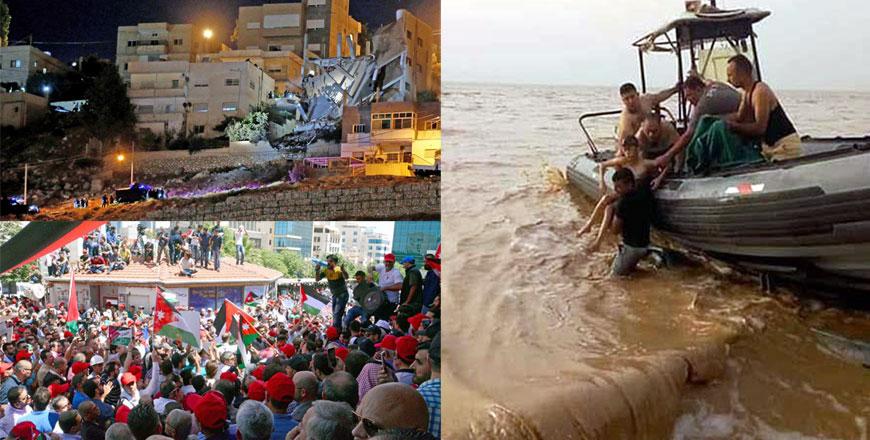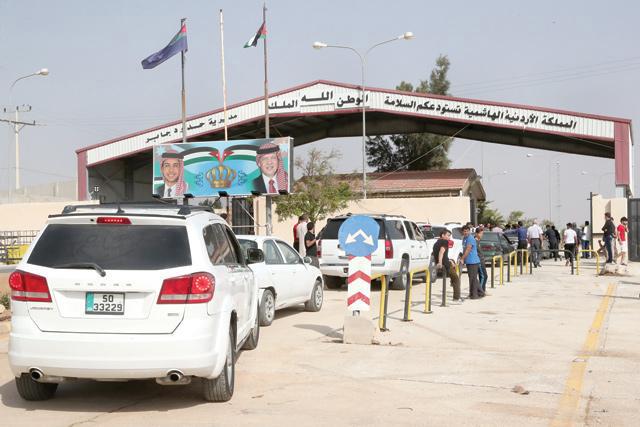You are here
2018, unforgettable year for Jordan
By JT - Jan 01,2019 - Last updated at Jan 01,2019

Three defining events struck Jordan in 2018 (JT file photos)
AMMAN — The Kingdom was plagued with two tragic incidents that claimed the lives of dozens of Jordanians in 2018: flashfloods in the Dead Sea area and a terrorist attack in Balqa Governorate.
Another milestone event during last year was the nationwide protest and the subsequent strikes in June against the income tax law bill which led to the resignation of prime minister Hani Mulki’s government and the withdrawal of the controversial bill from Parliament.
The year also saw the reopening of Jordan’s border with Syria, after three years of closure due to the escalating violence in southern Syria.
Flashfloods
On October 25, flasfhloods near the Dead Sea claimed the lives of 21 people, most of them schoolchildren on a field trip, along with families picnicking in the hot springs nearby.
A total of 46 students and teachers from a private school in Amman were swept away in the water.
The number of those rescued after the flood was 35, while the number of missing was unknown at the time, as too many people were present in the direct vicinity of the flood.
Chairing a follow up meeting on the incident with the National Policies Council, His Majesty King Abdullah expressed his deepest condolences to the victims’ families and to all Jordanians.
“Yesterday’s [October 24] tragedy touched us all as Jordanians. May God rest the victims’ souls in peace and give us fortitude,” His Majesty said.
A total of 2,000 personnel from military and civil state agencies participated in the large-scale rescue operation, in addition to four helicopters and boats, searching the Dead Sea for survivors or victims.
All school trips were cancelled until further notice following the incident. Ministers of education and tourism Azmi Mahafzah and Lina Annab presented their letters of resignation to Prime Minister Omar Razzaz a week after the tragedy, as calls for the ministers’ resignation mounted both popularly and in Parliament.
The Prime Ministry published the joint recommendations of the impartial and ministerial committees formed to investigate the incident. Measures and procedures were proposed to help avoid the recurrence of similar tragedies in the future.
Terrorism
A primitive bomb ripped through a Gendarmerie vehicle in Fuheis on August 10, near leaving one officer dead, Ali Qawqazah, and six others injured.
In the raid on a building in Salt on August 11, where the terrorists were tracked down.
Four joint security force personnel died and several others were injured. Security agents arrested five terrorists and killed three others in the raid.
The King, the Supreme Commander of the Jordan Armed Forces-Arab Army, visited the family of the officer who was killed in the terrorist attack in Fuheis, and the families of the other four who lost their lives in the subsequent raid, to offer his condolences.
Nationwide rallies
In June, Mulki submitted the resignation of his government to the King, following nationwide protests and a strike called upon by the Professional Associations Council against a new income tax bill, which sought to expand the taxable income base from 5 per cent to 10 per cent.
His Majesty entrusted Omar Razzaz, former education minister in Mulki’s government, to form the new cabinet.
Jaber/Nasib Border Crossing
Also in 2018, the Jaber/Nasib crossing between Jordan and Syria was back to business as usual in mid-October, after it was reopened for passenger and cargo movement under certain conditions agreed upon between the two countries.
In 2015, Jordan closed the Jaber Border Crossing with Syria due to security concerns, while Ramtha, the other border crossing, had been closed for more than five years.
The first day of the re-opening was limited to the movement of small number of citizens and investors, while cargo movement remained suspended as clearance at the Jaber crossing was not operational until the owners of clearance offices there renewed their licences.
Billions of dollars in annual trade with Europe and the Gulf moved through the crossing until fighting erupted in 2011.
The border point was captured by rebels in 2015 and its closure hurt the economies of both Syria and neighbouring states.
Following the re-opening, experts, in interviews with The Jordan Times, hailed what they labelled as the “long-awaited and much-needed” step to boost many sectors to drive economic growth.
Jordanian citizens also rushed to revisit the northern neighbour.
Since the reopening, the UNHCR has confirmed, through its database, the return of 3,852 refugees who left through the crossing between Jordan and Syria between October 15 and December 1.
Related Articles
AMMAN — Since its reopening in mid-October, the Jaber Border Crossing with Syria has received around 138,000 arriving and departing&nbs
AMMAN — The Jordan Dental Association (JDA) will participate in Damascus’ 19th International Scientific Dental Conference next month.JDA spo
AMMAN — The first delegation representing Jordan’s producers, exporters and importers of agricultural produce is set to head to Damascus on


















